
When choosing an ecommerce platform for your online business, two of the most popular options are Shopify and GoDaddy. Both platforms offer a wide range of tools to help merchants set up and manage their online stores.
However, each platform has its own strengths and weaknesses, making it essential to understand their key differences.
This comparison will take a deep dive into Shopify vs GoDaddy ecommerce, helping you decide which one is best suited for your business needs.
What is GoDaddy?

GoDaddy is a leading global services platform designed to help entrepreneurs and individuals build and manage their online presence. It provides a comprehensive range of tools and services, including domain name registration, web hosting, and website building tools.
As one of the world’s largest domain registrars and web hosting providers, GoDaddy serves millions of customers worldwide, offering an integrated ecosystem to help businesses launch, grow, and manage their online operations efficiently. Whether you’re starting a blog, building an eCommerce store, or growing a small business, GoDaddy’s all-in-one solutions are designed to simplify the process.
What is Shopify?

Shopify is an all-in-one commerce platform that enables businesses and entrepreneurs to start, run, and grow online stores to sell products and services. It provides a comprehensive set of tools to build websites, manage inventory, process payments, and handle sales both online and in person, all from a single, user-friendly system.
Shopify operates on a subscription-based model, eliminating the need for software installation or hosting. It caters to businesses of all sizes, from small startups to global enterprise brands, making it a versatile solution for anyone looking to launch and scale an online store.
Shopify vs GoDaddy Pricing Plans
When comparing Shopify and GoDaddy, pricing is a key factor in determining which platform is best suited for your business.
Shopify Pricing Plan
- Basic plan: $39/mo
- Grow plan: $105/mo
- Advanced plan: $399/mo
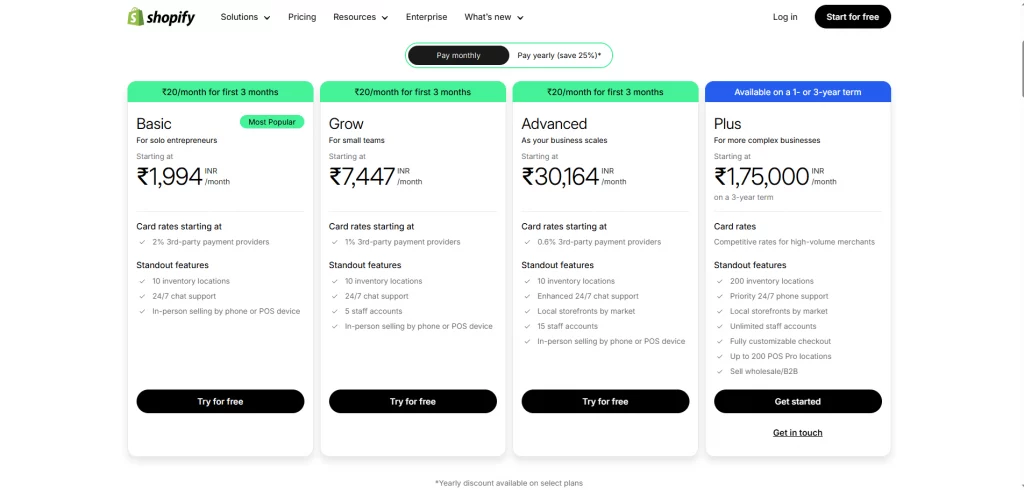
GoDaddy Pricing Plan
- Basic plan: $9.99/mo
- Standard plan: $11.99/mo
- Premium plan: $14.99/mo
- Ecommerce plan: $20.99/mo (you need this plan to sell!)
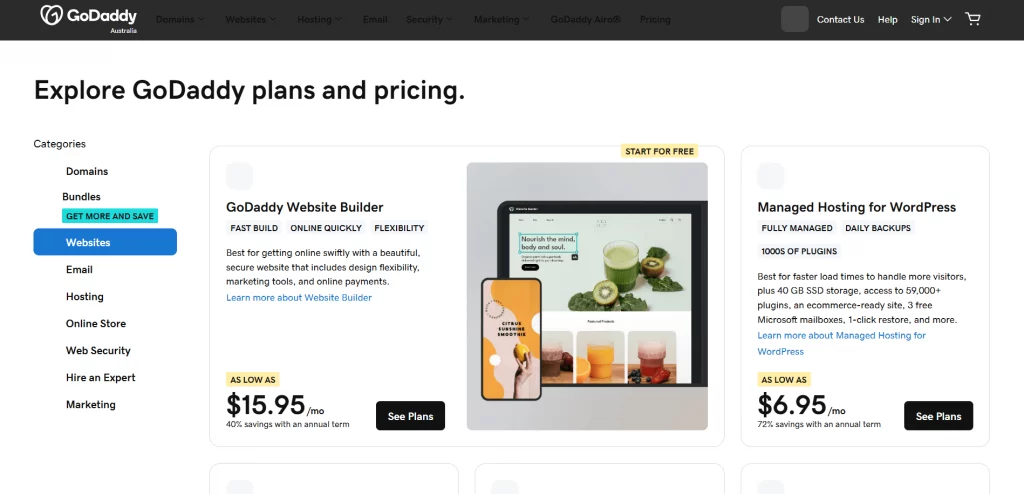
Shopify vs GoDaddy: Step-by-Step Comparison
| Feature | Shopify | GoDaddy |
| Ease of Use | User-friendly, drag-and-drop interface | Simple and easy to use |
| Design Flexibility | Hundreds of customizable themes | Limited themes with fewer customization options |
| Pricing Plans | $39 to $399/month | $9.99 to $24.99/month |
| Transaction Fees | 2.9% + 30¢ per transaction | No transaction fees |
| Payment Gateways | Multiple payment gateways including Shopify Payments | Limited payment gateways (PayPal, Stripe, etc.) |
| Customer Support | 24/7 support (chat, email, phone) | 24/7 support (chat, email, phone) |
| eCommerce Features | Advanced ecommerce features like abandoned cart recovery, product reviews, and more | Basic eCommerce features like inventory management, order processing |
| SEO Features | Built-in SEO tools, editable meta tags, structured data | Basic SEO tools, custom meta tags, limited optimization |
| App Integrations | Extensive app store for integration with marketing, shipping, and accounting tools | Fewer third-party app integrations compared to Shopify |
| Mobile Responsiveness | Fully responsive mobile-friendly designs | Responsive designs available but with fewer options |
GoDaddy vs Shopify: What’s the Pros & Cons?
Below is a comparison of the pros and cons of GoDaddy and Shopify.
GoDaddy Pros & Cons
Pros
- Affordable pricing, making it ideal for small businesses or individuals just starting out.
- Easy to use with an intuitive interface, perfect for beginners without technical expertise.
- All-in-one solution for domain registration, hosting, and eCommerce tools.
- Built-in marketing tools such as email marketing, SEO, and social media integrations.
- Free SSL certificates and hosting with higher-tier plans, ensuring security.
Cons
- Limited customization options compared to Shopify, especially for advanced users.
- Basic eCommerce features, lacking scalability for larger businesses.
- Fewer third-party integrations and apps available.
- Limited payment gateway options, which can be restrictive for certain markets.
- Basic reporting and analytics tools, offering fewer insights into store performance.
Shopify Pros & Cons
Pros
- Scalable platform that grows with your business, from small stores to large enterprises.
- Extensive eCommerce features such as abandoned cart recovery, product reviews, and detailed reporting tools.
- High customization options with a wide range of customizable themes and design options.
- A large app store with thousands of apps to enhance store functionality.
- Supports over 100+ payment gateways, making it easier to accept payments globally.
- 24/7 customer support via phone, chat, and email.
Cons
- Higher pricing compared to GoDaddy, which may not be suitable for small businesses or tight budgets.
- Charges transaction fees unless Shopify Payments is used, adding extra costs for third-party payment gateways.
- Learning curve due to the vast range of features and customization options.
- Many advanced features require third-party apps, which can incur additional costs.
- Limited content management flexibility compared to some other platforms, especially for content-heavy stores.
Shopify vs GoDaddy: Which One Should You Choose?
Choose Shopify: Shopify is ideal if you're looking to scale your business with advanced eCommerce features and customization options. It offers a comprehensive solution with a powerful app store, a wide range of payment gateways, and excellent customer support. Shopify is perfect for businesses of all sizes, especially if you plan to grow your online store and need robust reporting tools, detailed analytics, and scalability.
Choose GoDaddy: GoDaddy is a great choice for small businesses or individuals just starting out. It offers a user-friendly platform at a lower cost, providing an all-in-one solution for domain registration, hosting, and basic eCommerce features. If you're on a budget and need a straightforward, easy-to-use platform, GoDaddy is an excellent option for launching your online store.
Which Platform Will Take Your Business Further? Final Thoughts
If your priority is ease of use, flexibility, and fast store setup, Shopify is an excellent choice, especially with its extensive app marketplace and seamless dropshipping integrations. For businesses looking for robust built-in features, advanced SEO capabilities, and strong B2B tools, GoDaddy provides a simpler solution, although it may require third-party apps for advanced functionality.
In both cases, your platform is just the foundation—optimizing it with the right tools is what truly makes the difference. For Shopify merchants, apps like iCart – Shopify Upsell App and Wholesale Hero B2B Pricing can help boost average order value, streamline wholesale pricing, and improve the overall shopping experience.
Still unsure? Check out our guide comparing other leading ecommerce platforms to help you choose the best fit for your business.
- Wix vs Shopify
- WooCommerce vs Shopify
- Shopify vs Shopify Plus
- Ecwid vs Shopify
- Shopify vs Squarespace
- Bigcommerce vs Shopify
- Shopify vs Weebly
- Big Cartel vs Shopify
FAQs Shopify vs GoDaddy
1. Does GoDaddy offer a built-in app store?
No, GoDaddy has limited app integrations, whereas Shopify offers a vast app marketplace for extended functionality.
2. Which platform supports more payment gateways?
Shopify supports over 100 payment gateways, while GoDaddy offers fewer payment options.
3. Does Shopify have better SEO tools?
Shopify provides advanced SEO features such as customizable meta tags and structured data, while GoDaddy offers basic SEO tools.
4. Which platform is better for multi-channel selling?
Shopify excels with multi-channel selling, allowing you to sell on social media, marketplaces, and more. GoDaddy offers limited multi-channel integration.
5. Can I migrate my store from GoDaddy to Shopify?
Yes, you can migrate from GoDaddy to Shopify, but it may require some technical work. Shopify offers tools to simplify migration.


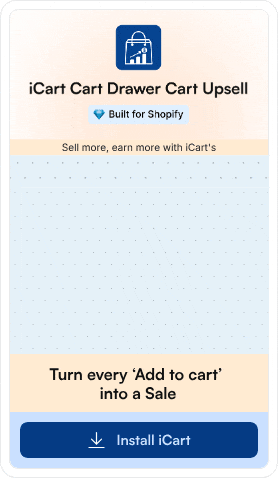
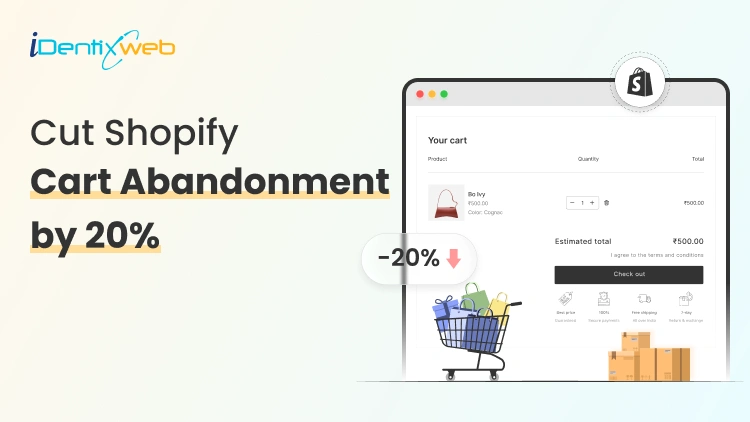
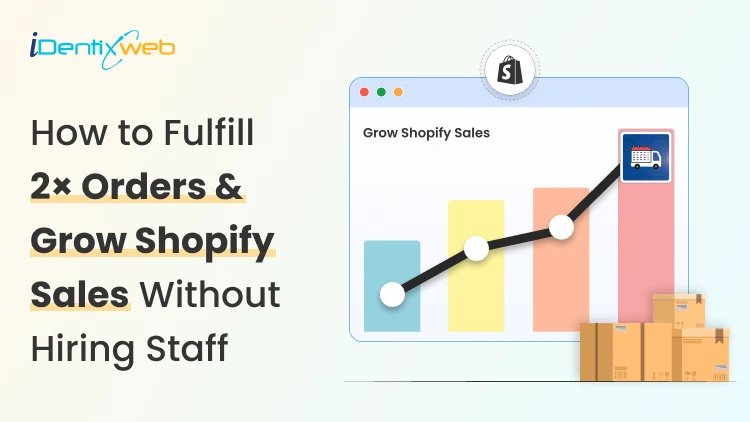
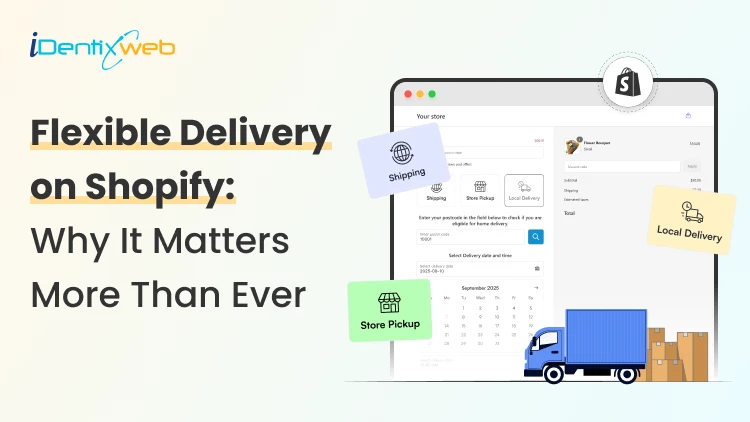

About the author
Bhavesha Ghatode
Explore Content with Bhavesha, a passionate and dedicated technical content writer with a keen understanding of e-commerce trends. She is committed to sharing valuable insights, practical assets, and the latest trends that can help businesses thrive in a competitive environment.